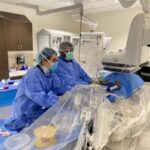A recent survey by Deloitte & Touche USA disclosed that 29 percent of hospital CEOs believed that their hospitals could fail in the next five years. Although down from 32 percent two years ago, the outlook and the challenge to survive and thrive is still daunting.
What are hospitals doing to meet their mission statements and deliver exceptional quality in a cost-effective way? Are community hospitals at greater risk, or do large, teaching facilities tackle tougher times ahead?
Jackson Health System in Miami, is a mega-complex with nearly 1,498 beds and more than 10,000 FTEs. It is also a tertiary teaching hospital offering transplants, a burn center and a trauma center. It is also the parent to Jackson South Community Hospital, a “community hospital” with approximately 200 beds.

But over 30 percent of the health systems admissions are unfunded, according to Steven Klein, Executive Vice President and Chief Operating Officer.
Eighteen months ago, the system called in Deloitte Consulting to set a plan into motion to keep the organization viable.
“We were running out of cash,” says Klein.
The result was “Project Recreate Jackson” a strategy that dealt head-on with cost reduction, revenue enhancement, and cost avoidance a formula that has worked!
Cost reduction was key, but difficult, says Klein. “We had to address better pricing on supplies, pharmacy, reduce equipment expenses, and seriously look at reducing FTEs. This is essential, but never easy.”
About Steven Klein
Education: Masters Degree in Public Health, University of Pittsburgh
Family: Wife and two children, residing in Coconut Grove
Community Involvement: American Cancer Society; Blood Bank of South Florida; Dade County Economic Development Council
What he likes most about working in health care: “The variety and the challenge”
What “inspires” him: “The success of others. If they can do it; I can do it. |
He adds that the greatest challenge is to accomplish this and honor our commitment to exceptional care while maintaining “one standard of care for everyone.”
Being in Miami, many of the hospitals patients are indigent and transient uninsured or underinsured. “Miami is a gateway,” Klein explains. We get patients from all over the world some for transplants or other tertiary or higher levels of care. Other patients represent a more “floating” population for trauma and more traditional treatment and care. Miami-Dade County is also “atypical,” with one-third of the county being uninsured or underinsured.
Cost avoidance has been integral in managing this challenge and providing a better bottom line.
“We have implemented a better mechanism for screening patients up front to determine non-residents and transitory patients and define what provider is most appropriate for them.”
In addition, Jackson has been aggressive with “denial management” implementing processes for determining Medicaid qualification and working proactively with all insurance providers to reduce the percentage of uninsured days.
These two steps have resulted in “revenue enhancement” and have helped keep the system extremely viable in an intensely competitive market.
How competitive is the Miami-Dade County healthcare market?
“On a scale of one-to-10, were about a 10.5,” says Klein. “There are about six major healthcare systems in the area. This is one of the most competitive areas in the country.”
Unlike some hospitals, physician recruitment is not a problem at Jackson Health System it is owned by Miami-Dade County and is an academic teaching hospital affiliated with the University of Miami Miller School of Medicine representing some 600 doctors.
Klein says “The work we do here the trauma, transplants, tertiary care, and beyond attracts physicians because of the stimulating, challenging environment.
Jackson Health System, like other hospitals and systems in the country, continues to be challenged by increased insurance premiums by the public, reduced coverage to employees, rising costs of equipment and labor and staffing.
“Insurance and reimbursement issues have become increasingly intricate and complex,” Klein adds, resulting in more sophisticated insurance contracts to ensure adequate coverage especially with the acute levels of care the Jackson delivers.
“We will continue to meet our challenges and obstacles, while seeking out new opportunities to provide the same standard of care for which we are known and deliver that care to everyone.
Post Views: 898
 But over 30 percent of the health systems admissions are unfunded, according to Steven Klein, Executive Vice President and Chief Operating Officer.
Eighteen months ago, the system called in Deloitte Consulting to set a plan into motion to keep the organization viable.
“We were running out of cash,” says Klein.
The result was “Project Recreate Jackson” a strategy that dealt head-on with cost reduction, revenue enhancement, and cost avoidance a formula that has worked!
Cost reduction was key, but difficult, says Klein. “We had to address better pricing on supplies, pharmacy, reduce equipment expenses, and seriously look at reducing FTEs. This is essential, but never easy.”
But over 30 percent of the health systems admissions are unfunded, according to Steven Klein, Executive Vice President and Chief Operating Officer.
Eighteen months ago, the system called in Deloitte Consulting to set a plan into motion to keep the organization viable.
“We were running out of cash,” says Klein.
The result was “Project Recreate Jackson” a strategy that dealt head-on with cost reduction, revenue enhancement, and cost avoidance a formula that has worked!
Cost reduction was key, but difficult, says Klein. “We had to address better pricing on supplies, pharmacy, reduce equipment expenses, and seriously look at reducing FTEs. This is essential, but never easy.”

























